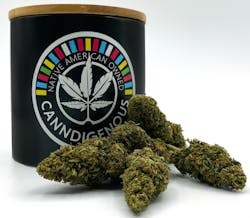Blackheads? Zits? Say goodbye to acne with a brand new cure—synthetic cannabis!
That, at least, is the hope of Botanix Pharmaceuticals Ltd., a dermatological company that just announced the completion of its Phase 1 clinical trial for an acne drug that incorporates synthetic cannabidiol (CBD). Called BTX 1503, the goal is that the drug could one day be an answer to acne.
Botanix began clinical trials of the drug in Australia last year. Twenty participants, all without acne symptoms, applied the synthetic cannabinoid-based topical over the course of a month to test its safety, tolerability, and pharmacokinetics (the amount of the drug detectable in the bloodstream after use).
The company plans to start a pilot program for acne patients later this quarter.
Clinical trials tend to be expensive, lengthy, and uncertain. A Phase 1 Study is preliminary—it determines whether a drug is safe enough to test on actual patients. Botanix managed to complete its Phase 1 trial within 12 months, and they say it has been a huge success. “Top line data demonstrates that BTX 1503 has an excellent safety profile, with little to no skin irritation, and no severe adverse events were recorded,” the company said.
Botanix attributes the relatively small levels of the drug which were recorded in participants’ bloodstreams to its so-called Permetrex delivery technology. According to the company, the product “ensures that the majority of BTX 1503 is delivered across the outer layer of the skin and into skin tissue,” rather than entering the bloodstream.
The company plans to start a pilot program for acne patients later this quarter.
Why synthetic cannabidiol for acne? Although acne affects millions and has been studied extensively, there are relatively few effective medications that are free from side effects. While CBD as a treatment for acne isn’t very well studied, Botanix points to one 2014 academic paper published in the Journal of Clinical Investigation. That study used biopsies of human scalp and arm skin to try to determine whether CBD could suppress acne.
The researchers found that CBD inhibited both lipogenic action (the way the body converts energy to fat for storage), and the production of sebocytes (cells in the sebaceous glands which produce the oil which coats the hair and skin of mammals). Both processes are known to contribute to acne. The study also suggested that CBD had an anti-inflammatory effect on the skin. An important caveat, however, is that the study didn’t test CBD on actual, living humans.
Now Botanix is trying to put the research to the test in human trials.
The use of synthetic CBD, which doesn’t require growing cannabis plants, allows the company to avoid certain regulatory obtacles, which is one factor behind the company’s quick movement in the sector.
Meantime, Nasdaq-listed Zynerba Pharmaceuticals has been conducting, in collaboration with Aussie contract research organization Novotech, a Phase 1 study in Australia of its drug ZYN002, a synthetic CBD formulated to be a gel. The product, applied to the skin, is aimed at treating epilepsy and osteoarthritic knee pain. The says the clear gel is designed to provide consistent, controlled, and sustained drug delivery in twice-daily dosing.






